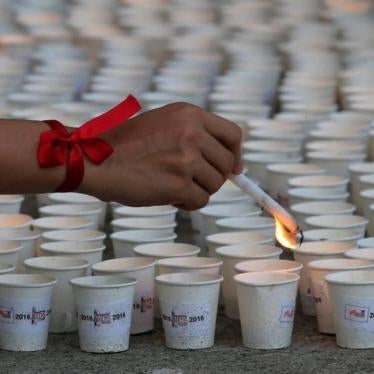Human Rights Watch welcomes the broader approach to governance demonstrated in the outline Strengthening Bank Group Work on Governance and Corruption (the outline) and the opportunity to comment on it. Our comments for this consultation focus on measures to enhance public oversight in order to improve government accountability.
Our comments for this consultation focus on measures to enhance public oversight in order to improve government accountability. We have some suggestions on how the Bank Group can incorporate these governance issues into country strategies. We also recommend greater consistency in the World Bank’s approach to governance and building on past institutional precedents. Finally, we urge a more proactive approach towards governance and anticorruption through targeted steps in high-risk countries, such as those that are resource rich.
We agree that corruption is but one aspect of weak governance. As the Bank Group has previously noted in various studies, improving governance also requires a broader focus on transparency, accountability, and participation. In our view, a strong governance strategy will help citizens hold governments accountable, enable governments to better deliver services, and can contribute to improved respect for human rights. President Wolfowitz highlighted the importance of human rights when he said that a free press and active civil society were crucial for combating corruption and promoting good governance in his April 2006 speech in Indonesia. Mr. Wolfowitz also spoke out in April 2006 against the arrest and imprisonment of two civil society representatives who were publicly calling for greater transparency and accountability in relation to the use of oil revenues by the government of the Republic of Congo (Congo-Brazzaville). Similarly, paragraph 11 of the outline notes that a constrained media and unequal rights are elements that foster corruption. The World Bank has also recognized the importance of country conditions with respect to non-discrimination, labor and social protections, political participation, and the rule of law to a country’s development prospects.
In our view, the outline should give greater emphasis to transparency, participation, and accountability, and more clearly elaborate how these issues will be an essential part of an effective governance and anticorruption strategy. We have several suggestions on strengthening this aspect of the strategy and outline.
- The Country Assistance Strategy (CAS) should build upon the analysis of “Transparency and Voice” in the 2006 Global Monitoring Report by clearly indicating how accountability, the effective provision of services, and poverty alleviation is either enhanced or constrained by existing regulations and practice on freedom of assembly, association, expression and information. The CAS should also consider issues such as inclusion and non-discrimination, workers’ rights, rule of law, political participation, and social protection.
- As part of this effort, the Bank Group should assess whether the public, press, civil society, and freely elected officials are able to exercise their crucial oversight role. Such a review would examine whether the press is independent and free to scrutinize or investigate corruption, or whether civil society organizations are able to monitor and comment on government activities. One way for the Bank to do this would be to define explicit governance criteria pertaining to the above-mentioned issues in the Country Policy and Institutional Assessment (CPIA) when determining International Development Association (IDA) allocations. For non-IDA countries, the country strategy should use the same governance criteria developed for the CPIA. Some of these issues are already considered, but the Bank Group should expand its analysis and draw on credible, publicly available assessments. Assessments by United Nations human rights bodies, reports by independent human rights organizations, analyses of press laws or those governing the formation of civil society organizations, and consultations with domestic and international human rights organizations could form the basis for evaluating country conditions with respect to such criteria.
- The governance and anticorruption strategy should address the Bank’s response to government attempts to restrict public oversight of government activities. In particular, we hope the governance outline will be revised to give Bank Group staff the clear authority to publicly comment in cases when members of the press or civil society have faced undue restrictions, harassment, or have been subject to arrests and imprisonment because of their work to promote good governance or because they are publicizing or protesting against alleged acts of corruption. These measures are critical elements of good governance and anticorruption strategy, and would build upon the precedent set by Mr. Wolfowitz when he criticized the arrest and imprisonment of two civil society representatives in Congo-Brazzaville. This would also help to ensure that the Bank Group has a consistent approach to a problem that is a serious threat to good governance and anticorruption efforts. Elaborating on how the Bank Group could respond to these types of situations could be included in paragraph 28 under the categories of “transparency initiatives,” “check and balance state institutions,” and “better governance outside government.” The Bank Group may not always be the lead institution in publicly pushing for these interventions but it can work with other donors and institutions to incorporate these points. Leaving it out of the governance outline, however, would perpetuate an ad hoc approach that has too often led to silence in the face of serious threats to the pillars of good governance.
- We strongly support the draft strategy’s suggestion in paragraph 40 that the Bank Group should “explore ways to support the restitution of assets to countries plundered by corrupt leaders.” In many cases, those officials are also responsible for widespread human rights abuses, such as former Nigerian dictator Sani Abacha. It is equally important for the Bank Group to be proactive and take steps to prevent the theft of public resources. One key step would be to require and, if necessary, help fund public disclosure of revenues and expenditures and audits of key institutions as a part of the CAS in countries where there is a high risk of corruption. That step will make it more difficult for corrupt leaders to steal or mismanage those assets. This approach would build upon the Bank Group’s existing work on revenue transparency and public expenditure management. For example, in a resource-rich country, the bank should require public disclosure of government revenues and expenditures that meet standards such as the Extractive Industries Transparency Initiative (EITI) or the IMF’s Guide on Resource Revenue Transparency. The Bank Group should also insist upon publicly available audits of key institutions involved in the management of these funds, such as the central bank, state-owned natural resource companies, and other institutions. These steps would help reduce the risk of corruption and help to ensure sound management of government resources so that priority sectors that are crucial for good governance, human rights, and poverty alleviation receive appropriate allocations. If a government refuses to allow such audits, it would send a troubling sign that the government is not truly committed to transparency or a meaningful anticorruption strategy. Under those circumstances, the Bank Group should insist upon these steps as a key component to any new cooperation.
- It is also important that the World Bank examine its own role directly in relation to broader governance issues. The outline emphasizes anticorruption measures, but we would like to see the document address the Bank Group’s social and labor policies that have an impact on governance, such as the International Finance Corporation’s new standards. Other aspects would include designing and executing projects in a manner that avoids discrimination, is inclusive of marginalized voices, and respects human rights.
Human Rights Watch hopes that the strategy will incorporate these suggestions. The Bank Group should further consult with international human rights, anticorruption, and other organizations as well as those in borrowing countries as it develops its approach to these issues. While we recognize that the Bank’s priority is poverty reduction and economic growth, a strong, effective governance and anticorruption strategy will have to incorporate respect for human rights. This strategy is a key opportunity to address those linkages.
Sincerely,
/s/
Arvind Ganesan
Director
Business and Human Rights Program
Veena Siddharth
Asia Advocacy Director
Asia Division







